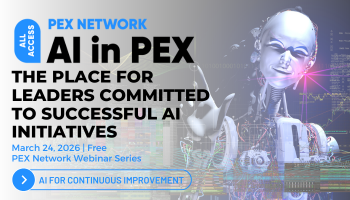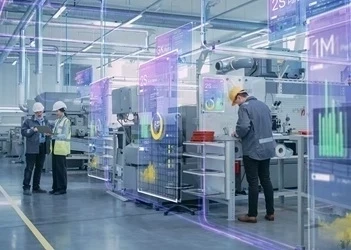Process intelligence: The foundation that gives meaning in the AI era
Process intelligence enables AI to move from potential to sustained value
Add bookmark
Artificial intelligence (AI) delivers real value when it operates with context, and process intelligence could provide that context.
AI is shaping every transformation agenda. Executives expect it to unlock efficiency, reshape customer interactions and create new ways of scaling. Yet in practice, I’ve seen that the difference between expectations and outcomes depends less on the technology itself and more on how well organizations understand their own processes.
Join the PEX Network community

Don't miss any news, updates or insider tips from PEX Network by getting them delivered to your inbox. Sign up to our newsletter and join our community of experts.
Learn MoreBPM as the starting point
Business process management (BPM) often doesn’t get the headlines, but it is where sustainable change begins. It gives organizations structure and a shared language, helping teams understand workflows, align priorities and sustain improvements. In my experience, this clarity matters just as much as ambition.
When uncertainty and volatility are the norm, BPM serves as an anchor. It stabilizes operations by making them transparent and measurable. Far from being rigid, it creates the foundation that allows change to happen with confidence.
Process intelligence as the bridge
The next step is process intelligence. Instead of assuming how operations should run, process intelligence uses real data to show how they actually do. That distinction is crucial. Bottlenecks, deviations and hidden patterns become visible.
With this insight, leaders can focus where it matters most. Process intelligence doesn’t guarantee success, but it creates conditions where AI can detect risks, support decision-making and scale automation in ways that are meaningful and measurable.
Without understanding the real process, AI risks becoming noise. With visibility, it has the chance to become impact.
Join us at All Access: Revolution in Process Intelligence APAC 2025!
Two perspectives from Latin America
Hearing from two major companies based in Latin America brought these ideas into sharp relief. Both companies operate at remarkable scale and are approaching process intelligence from different stages of maturity.
- One is one of the biggest airlines in Latin America, flying over 80 million passengers in 2024 and generating more than US$10 billion in revenue. It has started its process intelligence journey in financial back office processes. Beginning here may sound modest, but for a company that coordinates operations across dozens of airports and countries, clarity in financial workflows has implications that extend far beyond accounting. Even in its early phase, the initiative shows how a single back-office process can influence stability at scale.
- The other is a disruptive retailer, with over $20 billion in revenue in 2024, that has grown into one of the region’s most influential companies. I found it compelling to see how it is now extending process discipline into the transversal functions that underpin growth. This example demonstrates that value can be captured more than just in customer-facing operations but also in the processes that keep the enterprise running day to day.
What struck me in listening to both cases is the contrast. The first is at the beginning of its journey, using process intelligence to shed light on a critical finance process. The second one is already scaling, embedding process mining across back-office areas to capture value systematically. Together they show that transformation can start small or scale wide but in either case, clarity is what makes it credible.
Beyond the frontline
One of the key lessons from both examples is that business transformation does not reside only in the frontline. Back-office functions such as finance, HR and procurement are often overlooked. Yet they are precisely where inefficiencies accumulate and where transparency can unlock substantial value.
I’ve seen too many organizations pour resources into customer-facing initiatives while neglecting the processes that support them. Both, by focusing on back-office clarity, are building a foundation that strengthens the entire system.
A regional perspective
It also matters that this is happening in Latin America. The region combines world-class industries with operational challenges that are as complex as any in the world. The region is used to doing more with less and in that context process discipline is a necessity.
AI will continue to accelerate whatever it touches. What gives that acceleration direction is clarity. BPM provides the framework, process intelligence provides the visibility and together they create the conditions for AI to generate outcomes that matter.
For Latin America, and for any global enterprise operating at scale, clarity in processes is more than supportive. It is decisive. It is what allows AI to move from potential to sustained value.
All Access: AI in Process Excellence 2026

Don’t get left behind. Join us at All Access: AI in Process Excellence to learn from leading experts, thought leaders, and practitioners who are on the ground experimenting, researching, and learning how to best use AI. They will share their secrets with you for free. And you’ll have the opportunity to network with fellow professionals as we navigate this new world. Register now to save your spot.
Register Now












